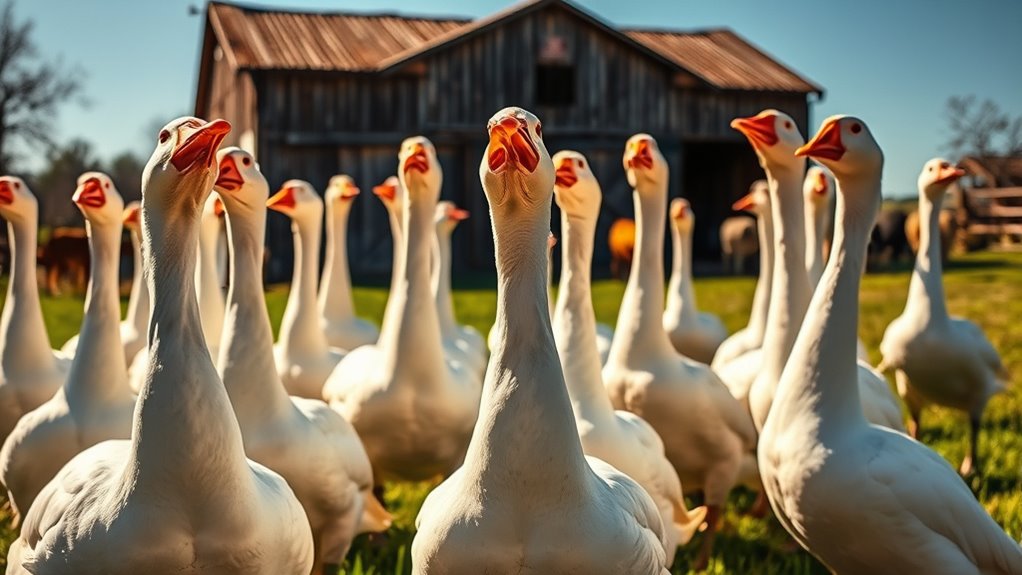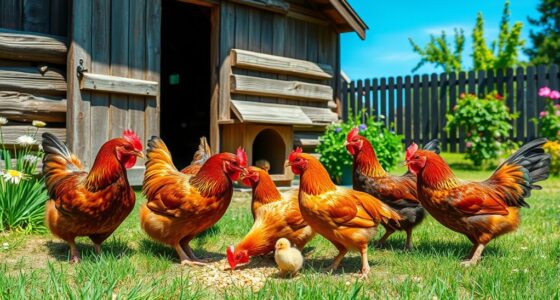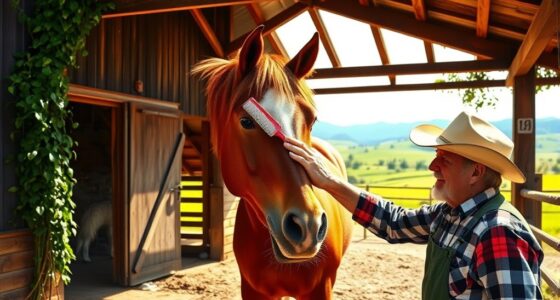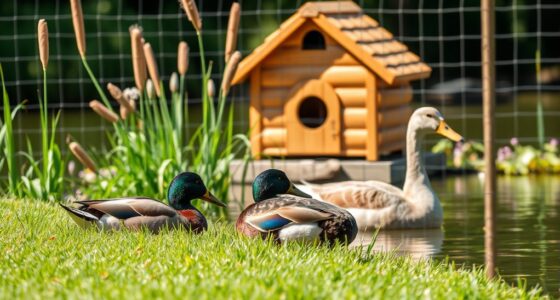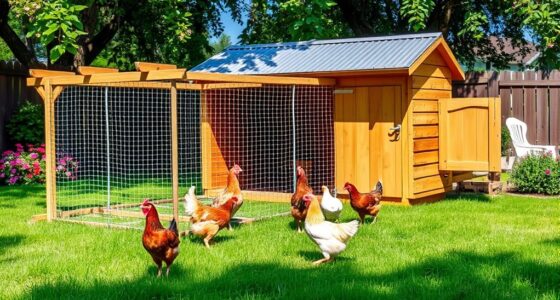Guard geese are a natural, cost-effective way to protect your farm. Their loud honks alert you to potential predators, while their vigilant nature ensures the safety of your flock. Choose the right breed based on size and noise level, and provide proper housing and care to keep them healthy. Just remember, they may not be effective against larger threats and can be aggressive. There's plenty more to discover about maximizing their protection abilities!
Key Takeaways
- Guard geese are effective at detecting aerial predators, providing an alarm system with their loud honking.
- Choosing breeds like African or Chinese geese enhances deterrent capabilities due to their size and noise.
- Proper training and imprinting from a young age ensure geese effectively protect your flock.
- Ensure adequate housing and care, with sufficient space and a nutritious diet, to maintain their health and guarding instincts.
- Be aware of limitations, such as ineffectiveness against larger predators and potential aggression towards humans or other animals.
Benefits of Using Guard Geese
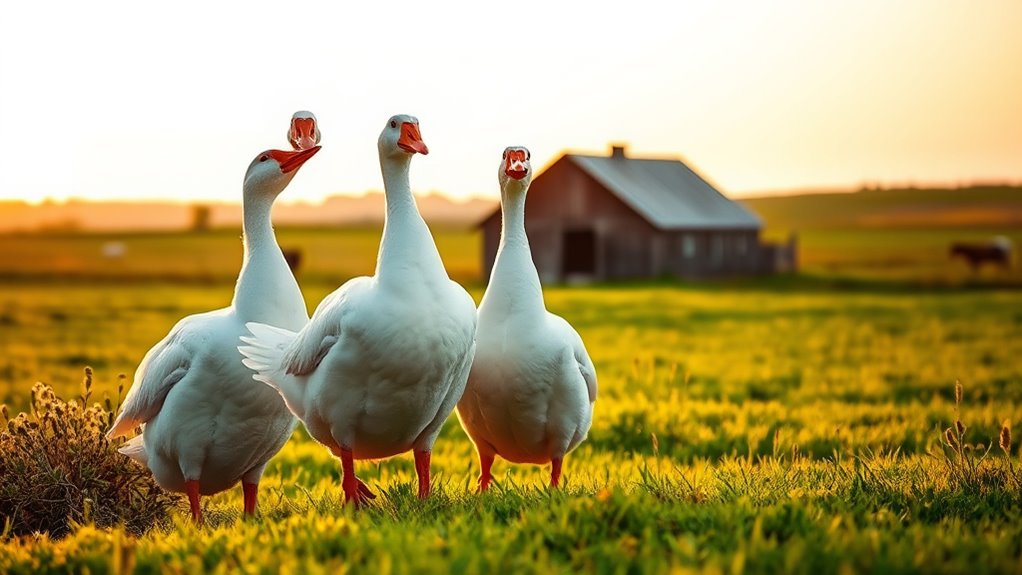
When you consider protecting your farm, using guard geese offers numerous benefits that can enhance your overall security.
Geese excel at detecting predators, especially aerial ones, by sounding loud alarms, alerting you to potential threats. Their natural protective instincts make them effective defenders of your territory, ensuring smaller flocks like chickens and ducks are safe from predators such as skunks and raccoons.
Plus, their loud honking serves as an excellent alarm system for unusual activity. Geese are cost-effective, providing additional benefits like eggs and meat while requiring minimal training.
Their superior vision and vigilance enable them to spot potential dangers early, making them a valuable asset in your agricultural security strategy.
Choosing the Right Breed for Your Needs
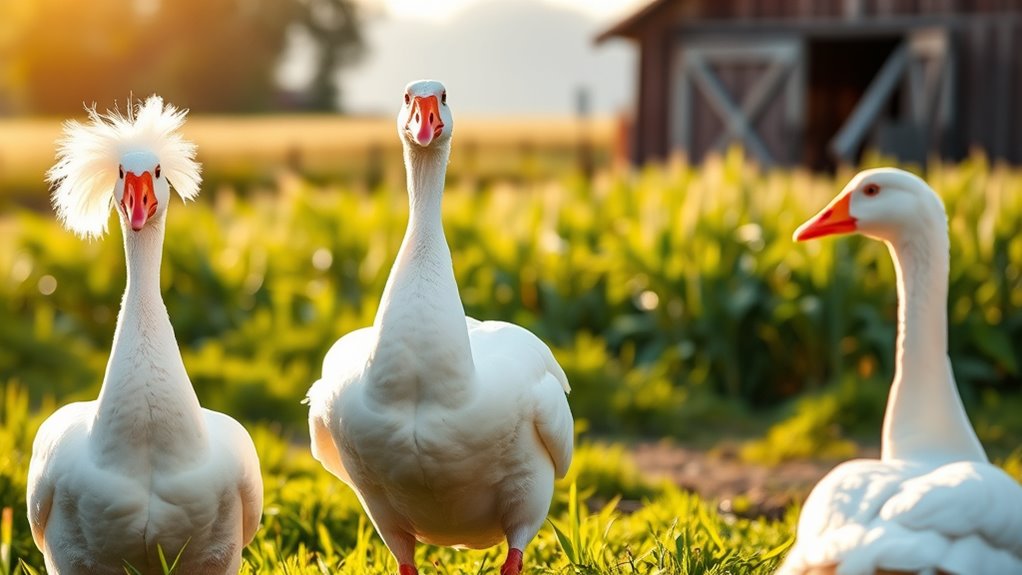
How do you choose the right breed of guard geese for your farm's unique needs? Start by considering size and noise level.
African and Chinese geese are large and loud, making them excellent deterrents for predators. If you need a smaller breed, the Tufted Roman geese can still alert you to threats effectively.
For those who appreciate a dual purpose, African geese provide both meat and guarding capabilities. If you're in a colder climate, African geese can adapt well, but ensure they've proper shelter.
Remember that geese are social animals, so it's best to keep more than one. Assess your specific requirements—whether noise, temperament, or other factors—to find the ideal breed for your situation. Additionally, maintaining a clean living space for your geese can significantly enhance their health and productivity.
Training and Imprinting for Effective Guarding
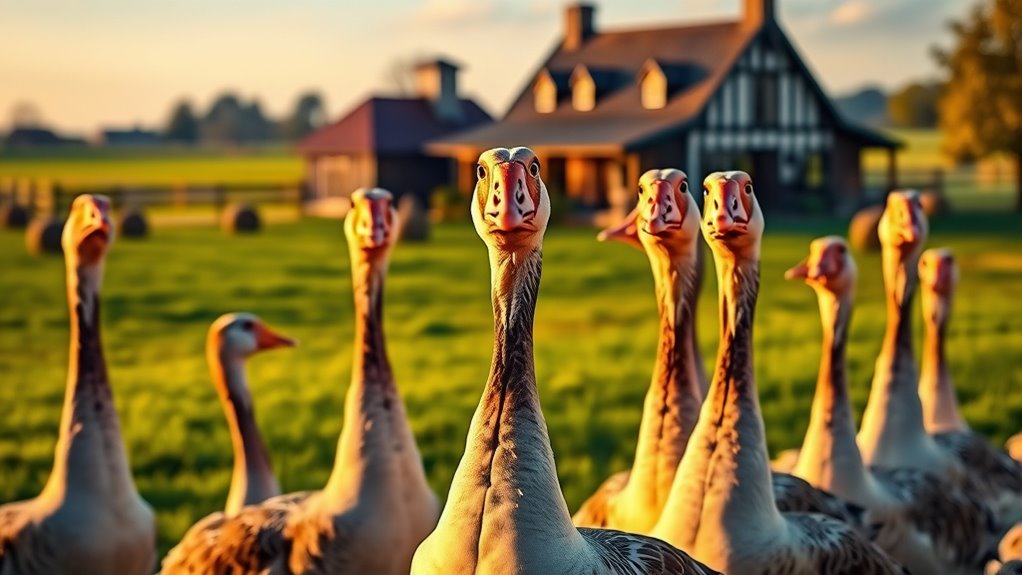
Training and imprinting guard geese effectively is essential for ensuring they fulfill their protective role on your farm.
Start by raising goslings with the flock they'll protect, allowing them to imprint early. Regular interaction helps reinforce their protective instincts, while socialization with other geese is crucial to prevent them from bonding solely with humans.
Familiarizing geese with your territory enhances their territorial awareness, making them more effective guards. During mating seasons, manage any aggression to maintain harmony.
Leverage their natural alert systems; their loud honking serves as an effective alarm against predators.
Remember, continuous training and environmental adaptability are key to maintaining their guarding instincts long-term.
With the right approach, your guard geese can become invaluable protectors of your farm.
Proper Housing and Care for Guard Geese
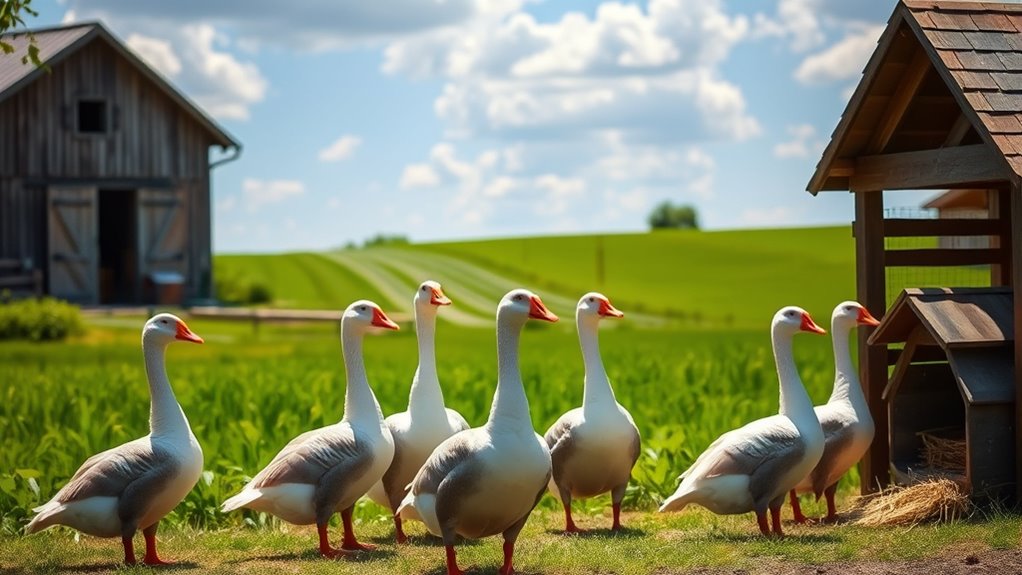
After ensuring your geese are well-trained and bonded to their flock, it's time to focus on their housing and care.
Each adult goose needs about 2-8 square feet of space, depending on their breed. Provide a strong, draught-free shed with a lockable door to protect them from predators at night. Use wood shavings or sawdust for flooring to prevent respiratory issues, and ensure good ventilation.
Geese thrive on short grass, so manage your pastures effectively. Supplement their diet with wheat, layer pellets, and fresh greens, along with grit for digestion. Always provide access to clean water.
Limitations and Risks of Using Geese as Guards
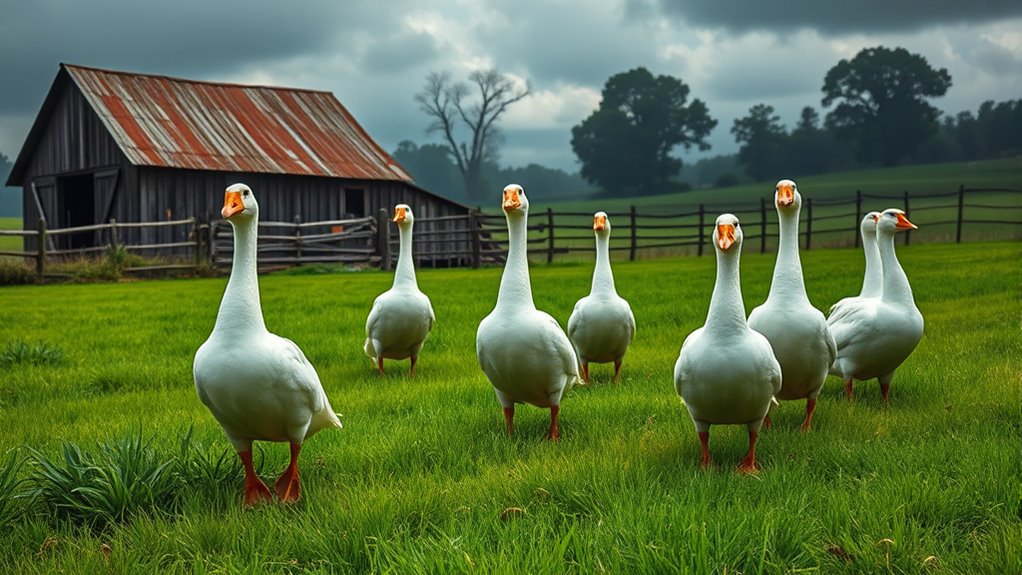
While geese can be effective at deterring certain smaller threats on the farm, they come with notable limitations and risks that need careful consideration.
They're not a match for larger predators like coyotes or bobcats, and their effectiveness drops at night due to their poor vision.
Their aggressive nature can lead to injuries for humans, especially during mating season, and they may attack other livestock if not properly managed.
Geese can be aggressive, posing risks to humans and other livestock if not carefully managed.
Additionally, Canada geese are federally protected, so you must adhere to legal regulations regarding their management.
Their noise can also be disruptive in residential areas, and their presence may alter local ecosystems, making it crucial to weigh these factors before relying on geese for protection.
Practical Applications of Guard Geese on Farms
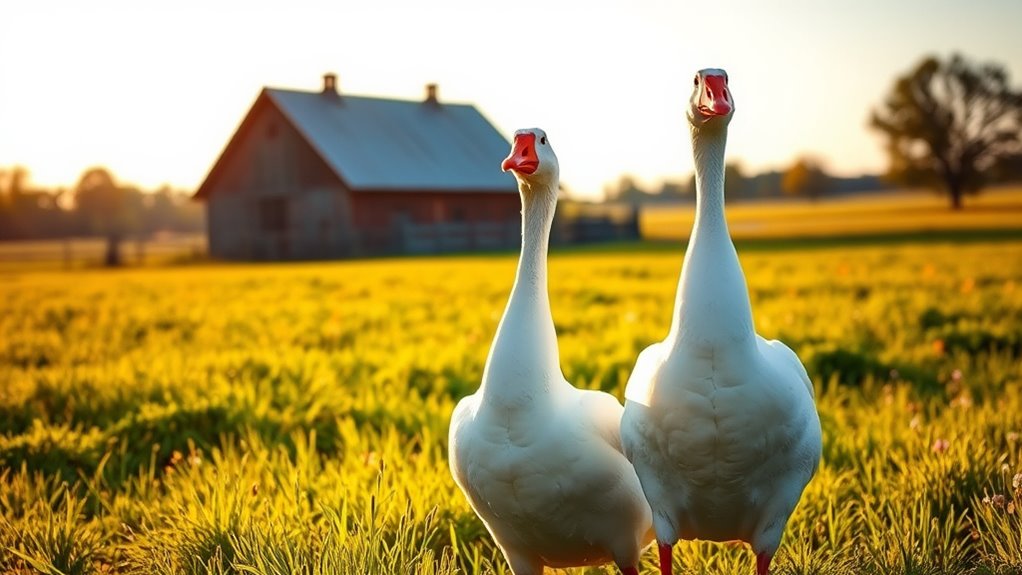
When considering practical applications of guard geese on farms, you'll find that these birds offer a variety of benefits beyond simply warding off intruders.
Geese excel at predator detection, spotting aerial threats like hawks with their sharp eyesight. Their loud honking acts as an alarm system, alerting you to unusual activity.
Geese also provide territorial protection, confronting smaller predators like skunks. They can be integrated into flocks of other birds and serve multiple roles, from guarding to weeding and even producing eggs and meat.
With a lifespan of up to 25 years, they're a cost-effective long-term investment. Plus, their grazing habits help maintain your lawn and control weeds naturally.
Enhancing the Effectiveness of Geese in Guarding
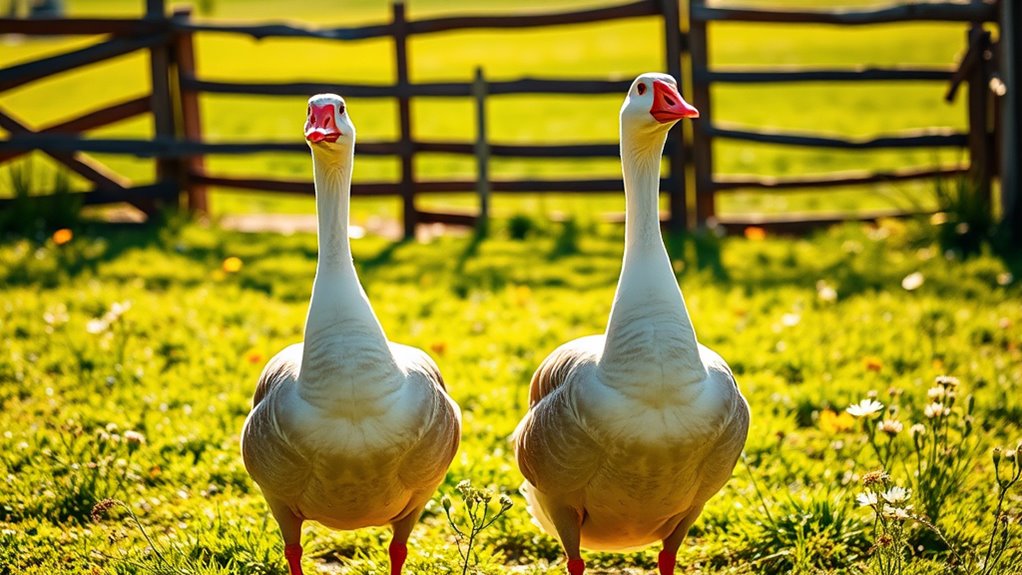
To enhance the effectiveness of geese in guarding your farm, it's essential to focus on breed selection and proper training.
Opt for breeds like Chinese geese, known for their loudness and protective nature. Raising goslings with chicks helps them bond, improving their guarding instincts.
Create an environment that allows geese to maintain a good vantage point and ensure they're contained to avoid distractions.
Remember, geese excel against smaller predators but aren't effective against larger threats like coyotes.
At night, since their eyesight is poor, additional security measures are crucial.
With their excellent visual surveillance and natural alarm systems, geese can alert you to potential threats, making them valuable assets in farm protection.
Integrating Geese With Other Livestock for Optimal Protection
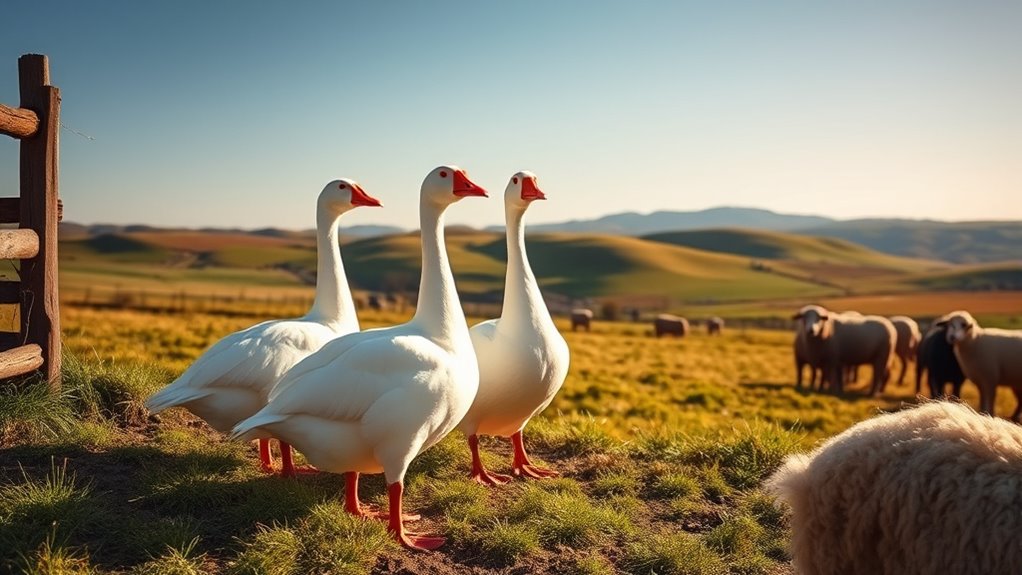
Integrating geese with other livestock can significantly enhance your farm's protection strategy. Since geese are social animals, raising them alongside other livestock fosters strong bonds, improving their overall happiness and effectiveness.
Integrating geese with livestock boosts protection and creates strong social bonds, enhancing happiness and effectiveness on the farm.
They excel at detecting aerial predators, making them valuable guardians for your farm. Geese require about 8 square feet each, and using moveable electric fencing can help optimize space.
Their vegetarian diet not only keeps them healthy but also aids in weed control. However, be mindful of their aggression, especially during breeding season.
Choosing breeds like Chinese or African geese can maximize protective benefits. With careful management, geese can create an ecological balance while providing supplementary income through their meat, eggs, and feathers.
Frequently Asked Questions
How Do Guard Geese Interact With Other Farm Animals?
When you introduce guard geese to other farm animals, you'll notice their territorial nature. They can be aggressive, especially during mating season, and may defend their space fiercely.
If raised alongside chickens, they might form protective bonds. However, you should consider separate enclosures to prevent harassment.
Choosing less aggressive breeds and handling them properly can minimize conflicts, ensuring a more harmonious environment for everyone on your farm.
Can Guard Geese Provide Protection at Night?
Guard geese can't provide effective protection at night.
They're nearly blind in the dark, which limits their reaction time and ability to identify threats. While they might still sound an alarm if they detect movement, it's often delayed.
If you're relying on geese for nighttime security, consider using livestock guardian dogs or secure enclosures to keep your farm safe from nocturnal predators.
Combining measures will ensure better protection for your animals.
What Is the Lifespan of a Guard Goose?
Geese generally gain a good grasp of life, living anywhere from 10 to 25 years, depending on their environment and care.
In the wild, they face threats like predators and diseases, which can shorten their lifespan.
However, with proper nutrition and a safe habitat, they can thrive longer in captivity.
If you want your goose to enjoy a lengthy life, ensure it has a balanced diet, clean water, and a secure space.
Do Guard Geese Require Special Veterinary Care?
Yes, guard geese do require special veterinary care. You should schedule regular check-ups to catch any health issues early.
Keep an eye out for signs of illness like limping or withdrawal. Common problems include bumblefoot and parasites, which need specialized treatment.
Make sure you have a vet experienced in birds available for emergencies, and don't forget to provide a balanced diet and clean living spaces to keep them healthy.
How Do I Introduce New Geese to Existing Ones?
Introducing new geese feels a bit like inviting guests to a party—everyone's got to get along!
Start by quarantining the newcomers, keeping them in separate enclosures nearby. Allow them to see and hear each other without touching.
When you're ready, introduce them at night, with the gander temporarily separated. Supervise closely and give it time; patience is key as they establish their new pecking order.
Keep an eye on their behavior to ensure harmony.
Conclusion
In the grand tapestry of farm life, guard geese are like vigilant sentinels, their honks echoing like a watchful knight's call to arms. By choosing the right breed, training them well, and providing proper care, you're weaving a protective shield around your crops and livestock. While they have their limits, when paired with other animals, these feathered guardians can create a harmonious defense. Embrace their unique gifts, and let your farm flourish under their watchful eyes.

